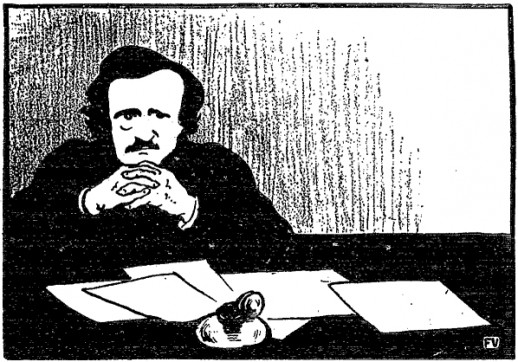

Or so think the six up-and-coming composers and librettists of The Poe Project, part of the Composer Librettist Development Program at the American Lyric Theater. It’s a compelling premise, and each of the three operas captures elements of Poe’s unsettling vision.
In a concert performance Monday evening at Symphony Space, a cast of six excellent and devoted singers, with pianist Leesa Dahl and conductor Keith Chambers, brought these works-in-progress to life. There was no staging, but the singers all knew how to establish a character even while standing in one place in casual concert dress. And while the operas are all still in development, they all construct disturbing, menacing worlds riven by fear.
According to the bio of composer Jeff Myers, Buried Alive “draws on themes of anxiety and mortality from Edgar Allan Poe’s story “The Premature Burial.” Really, all three of the Poe Project operas are built on themes of anxiety and mortality: Of the Flesh (music by Jay Anthony Gach, libretto by Royce Vavrek) applies those elements to disease and sex, and Embedded (music by Patrick Soluri, libretto by Deborah Brevoort) applies them to issues of aging and the darker side of fame.
Buried Alive (libretto by Quincy Long) opened the evening. Like the protagonist in Poe’s “The Premature Burial,” the painter Victor fears nothing more than the prospect of being buried alive. Of the three Poe Project operas, Buried Alive most convincingly achieves a Poe-esque slippage between the real and the surreal.
Victor’s death, established in the opening scene, turns out to be merely a nightmare; the morgue in the third scene suddenly falls away into the emergency room. And then, once we begin to think that Victor’s premonitions will be proven false, he awakes to find his fear coming to pass.
The naturalistic rhythms of the text-setting highlight the alternately irritated and loving intimacy between Victor and his wife Elena, as well as the sinister abyss between Victor and the Mortician. The mortuary/medical trio felt peculiar at first, even superfluous; that may have been partly due to the concert setting. But as the trio begin to interact with Victor and Elena, the intersection heightened the uncertainty between the living and the nightmare worlds.
…Of the Flesh inhabits a post-apocalyptic world much more literal than the ghostly realm of Buried Alive. As its title suggests, this opera explores the physical: disease, sex, breath, death. A flesh-eating virus ravaging the population. The parallels to the HIV epidemic feel too blunt, too easy: there’s the emergence of a mysterious, deadly disease, survivors’ sense of loss as friends upon friends die, the avoidance of touching others for fear of contracting it, and the isolation of those who are dying alone. And, of course, there’s the gay male couple at the center of the story.
But from this clunky (or is it campy?) premise, the opera builds a genuine creepiness. The libretto continually skirts the edge of the sexy and the sickly. Flesh is seduction, disease, even food; breath is both heady and invasive; sex is a submission and a domination, enticing yet potentially deadly. Leif’s sensual line “Biting at my lips” devolves into the aggressive “chewing at my skin,” paralleling the march of the disease across its victims. Even destruction has its allure.
It’s refreshing to see such a frank depiction of a gay couple’s love life and sex life as Harris and Vince. Their love duets begin sweetly and soon take on sinister undertones. After Vince’s death, the flirtation between Harris and Leif sparkles with coy humor. When Harris sets down his rules and declares that Leif should call him “Vince,” Harris’s use of the third person shifts the scene into something dark and peculiar.
Gach’s music dances with charisma. Finely tuned shifts of mood emerge through his keen sense of rhythm and rich harmonic vocabulary. The well-matched pair of Chrisopher Burchett (Harris) and Kevin Burdette (Vince) help keep the campy premise aloft.
In Embedded, the strongest elements are, curiously, the ones that are least Poe-like. Brevoort’s libretto shows an acute ear for contemporary speech, and she’s not afraid to use casual words like “yeah” or have a character call her rival a “bitch.” This opera earned the most laughs, particularly at lines like, “They have facials in Jersey, don’t they?” – coming from a fey stylist giving advice to the aging news anchor Sylvia. The voice of a GPS sings, “Recalculating.”
The staff on set declares that Sylvia needs more color in her cheeks, something to cover the lines in her face, anything that will make her look younger. Brevoort – the only woman amongst the librettists and composers – clearly understands the insults embedded in people’s attitudes toward women.
The point is made effectively by the pile-up in the newsroom, and we feel the sting. But then Sylvia sings an aria about what we’ve just witnessed, pointing out that men can go grey and women must dye, that men can wear wrinkles but women get Botox. “Take years off… That’s what women have to do!” We get it.
In his first conversation with Sylvia, the terrorist Montresor first points out that she’s “the top name in TV, the most trusted name in news.” She agrees. Then he flatters her: “You’re beautiful.” This is her vulnerable spot: “You think so?” Brevoort’s sensitivity to women’s predicaments may not be something Poe (or just about any male) would have written, but it rings true, and it’s often powerful.
If only the music were as resonant. After the subtlety and variety in the previous opera, the music of Embedded often feels square, even generic. It’s got moments of great color: the quick back-and-forth of the newsroom dialogue, the mimicry of a news program’s music bed. But it’s the libretto that carries this opera, along with the strong singing of soprano Caroline Worra as Sylvia.
Worra’s striking tone suited the role of Sylvia, bringing to life the news anchor’s vulnerability and twisted triumph. In …Of the Flesh, Worra captured Elena’s swings from warmth to foolishness, though she sounded a little strident at times.
Mezzo-soprano Sarah Heltzel made a commanding, sinister Mortician and Doctor in the evening’s first two operas. The baritone Christopher Burchett sang both Victor and Harris with power and depth, though some of his climactic moments seemed a bit scratchy; he seemed to be nursing a cough.
Tenor Chad Johnson used his youth and lightness to advantage in the roles of Leif and Sylvia’s assistant Rory, though he had the power where required. Jamie-Rose Guarrine captured the simpering flirtatiousness of upstart Victoria Reilly in Embedded, though in the other operas’ ensembles she didn’t quite match the volume of her cohorts. In Buried Alive, the imposing bass Kevin Burdette needed better diction, which he achieved in his singing of Vince.
As a trilogy, the operas work beautifully together. Centered around the common inspiration of Poe’s fiction, each work focuses on characters who are terrified – not just of death, but of ceasing to exist altogether.























Comments